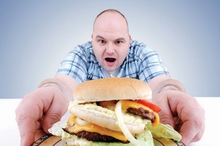 The Centers for Disease Control and Prevention released the results of a survey that found fast food accounts for 11% of what Americans eat daily. The study was conducted from 2007 through 2010 and asked 11,000 adults about what they had eaten in the last 24 hours.
The Centers for Disease Control and Prevention released the results of a survey that found fast food accounts for 11% of what Americans eat daily. The study was conducted from 2007 through 2010 and asked 11,000 adults about what they had eaten in the last 24 hours.The portion of American diets reserved for Wendy's, Burger King and the Yum Brands kingdom was smaller than it was during a 2003-06 survey, when fast-food accounted for 13% of American calories. It is an improvement that has fast-food investors scrambling, but experts contend it is still a grease-soaked bag full of bad news.
The calorie percentage is throwing everything out of whack here. Though fast food accounts for only 11% of those calories, previous studies have shown that Americans consume 270 calories worth of fast food a day -- basically a regular McDonald's hamburger and a fistful of fries.
That would put Americans at more than 2,700 calories a day, which is great if you're a 25-year-old man who's 6-foot-7 and exercises three times a week. However, for shorter, older or more lethargic, it is a recipe for a waistline disaster.
The CDC found that obese people get 13% of their calories from fast food, compared to less than 10% for those of normal weight or below. While people ages 20 through 39 get a full 15% of their calorie intake via the drive-thru window, that rises to 17% among people that age in households earning less than $30,000 a year.
By comparison, 20- to 30-somethings in households taking in more than $50,000 a year dedicated less than 14% of their calorie content to the quick and cheap.
Black Americans get 15% of their calories from fast food, compared to 11% for whites and Hispanics. Young black adults are by far the most ravenous consumers of fast food, with the CDC noting that a whopping 21% of their calories come from food ordered from illuminated menus above the counter.





